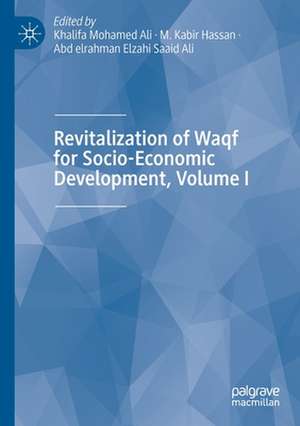Revitalization of Waqf for Socio-Economic Development, Volume I
Editat de Khalifa Mohamed Ali, M. Kabir Hassan, Abd elrahman Elzahi Saaid Alien Limba Engleză Paperback – 14 aug 2020
| Toate formatele și edițiile | Preț | Express |
|---|---|---|
| Paperback (1) | 1109.16 lei 6-8 săpt. | |
| Springer International Publishing – 14 aug 2020 | 1109.16 lei 6-8 săpt. | |
| Hardback (1) | 1113.09 lei 6-8 săpt. | |
| Springer International Publishing – 25 iul 2019 | 1113.09 lei 6-8 săpt. |
Preț: 1109.16 lei
Preț vechi: 1352.63 lei
-18% Nou
Puncte Express: 1664
Preț estimativ în valută:
212.24€ • 226.96$ • 176.96£
212.24€ • 226.96$ • 176.96£
Carte tipărită la comandă
Livrare economică 17 aprilie-01 mai
Preluare comenzi: 021 569.72.76
Specificații
ISBN-13: 9783030184476
ISBN-10: 3030184471
Pagini: 313
Ilustrații: XXXII, 313 p. 38 illus., 22 illus. in color.
Dimensiuni: 148 x 210 mm
Greutate: 0.45 kg
Ediția:1st ed. 2019
Editura: Springer International Publishing
Colecția Palgrave Macmillan
Locul publicării:Cham, Switzerland
ISBN-10: 3030184471
Pagini: 313
Ilustrații: XXXII, 313 p. 38 illus., 22 illus. in color.
Dimensiuni: 148 x 210 mm
Greutate: 0.45 kg
Ediția:1st ed. 2019
Editura: Springer International Publishing
Colecția Palgrave Macmillan
Locul publicării:Cham, Switzerland
Cuprins
1. Introduction.- 2. Role of Cash Waqf Deposit (CWD) as an Instrument for Socio-economic Development: Bangladesh Perspective.- 3. Waqf Philanthropy and Orphans’ Socio-Economic Development in Northern Nigeria based on Maqāṣid al-Shari’ah Principles.- 4. FinTech-enabled Cash Waqf: Effective Intermediary of Social Finance.- 5. Experiences and Lessons of Cash Waqf in Bangladesh and other Countries.- 6. The Role of Waqf (Endowment) in Economic Development of Bosnia & Herzegovina: A Historical Overview and Future Prospects.- 7. Using Waqf for Socio Economic Development in Bangladesh: Potentials, Challenges and Policy Directions.- 8. Cash Waqf Deposit Product: An Innovative Instrument of Islamic Banks for Socio-economic Development in Bangladesh.- 9. Can Waqf based Sukuk Reduce Foreign Debt? Case Study of Indonesia.- 10. Opportunities and Challenges of Waqf in Bangladesh: The Way Forward for Socio-Economic Development.- 11. Integration of Zakat and Awqaf for Poverty Alleviation and Development.- 12. Waqf Resource Mobilization for Poverty Alleviation Based on Maqasid Framework.- 13. Islamic Microfinance and Rehabilitation Program for the Slum and Floating Population by the Waqf Funds: A Proposal based on Empirical Evidences for the Muslim Countries.- 14. The Investment of Waqf Properties and Infrastructure Development.
Notă biografică
Khalifa Mohamed Ali holds MA and PhD in Economics from Iowa State University, USA, where he taught Economics. He worked as assistant and associate professor of Economics at the United Arab Emirates University, UAE, and is currently a senior economist at the Islamic Research and Training Institute (IRTI), Islamic Development Bank (IsDB).
M. Kabir Hassan is a Professor of Finance in the Department of Economics and Finance at the University of New Orleans, USA, where he currently holds two endowed Chairs—Hibernia Professor of Economics and Finance and Bank One Professor in Business. He was the University of Louisiana System’s outstanding faculty member for 2019. Dr. Hassan is the winner of the 2016 Islamic Development Bank (IsDB) Prize in Islamic Banking and Finance.
Abd elrahman Elzahi Saaid Ali is a Senior Economist at the Islamic Research and Training Institute (IRTI), Islamic Development Bank (IsDB).
M. Kabir Hassan is a Professor of Finance in the Department of Economics and Finance at the University of New Orleans, USA, where he currently holds two endowed Chairs—Hibernia Professor of Economics and Finance and Bank One Professor in Business. He was the University of Louisiana System’s outstanding faculty member for 2019. Dr. Hassan is the winner of the 2016 Islamic Development Bank (IsDB) Prize in Islamic Banking and Finance.
Abd elrahman Elzahi Saaid Ali is a Senior Economist at the Islamic Research and Training Institute (IRTI), Islamic Development Bank (IsDB).
Textul de pe ultima copertă
This book explores the various aspects of Waqf management in isIDB member countries/jurisdictions as well as in non-Muslim majority countries. Topics covered include Waqf regulation, its modernization and relationship to Maqasid Al-Shari’ah; performance of Waqf activities; time and activity-wise distribution of Waqf resource management; the antecedents and consequences of Waqf assets (both physical and cash); the strategies and models to promote Waqf-related activities for greater socio-economic development; good governance practices through the formulation of informed policies for Waqf projects; the confluence of Waqf, zakah, charity, and Islamic microfinance impacting socio-economic development and so on. Comprising different issues and perspectives adopted by various authors/researchers, the book is specifically designed to meet the needs of academics and industry practitioners in the field of Islamic finance to provide general and Shari’ah guidelines on the emerging issues within the subject.
Caracteristici
Brings together in one collection research discussing major issues in Islamic finance that has an impact on the future prospects of Waqf management in socio-economic development in the context of Muslim majority as well as of non-Muslim countries Provides a thorough review of the decisive role of Waqf management to achieve socioeconomic development at organizational, national, and international levels Features a Waqf management framework of some of the emerging and dominant countries in the Muslim world
